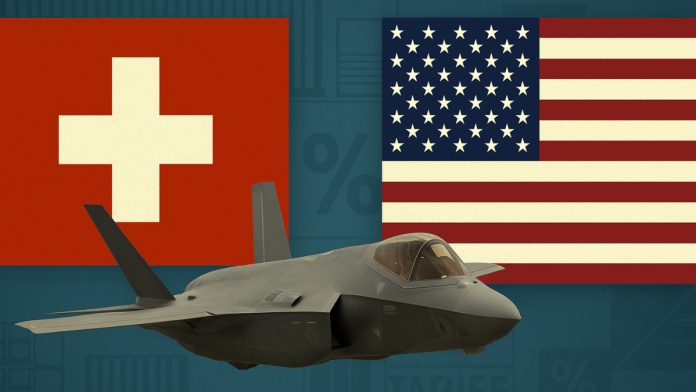Switzerland’s plan to buy 36 American F-35 fighter jets is facing a storm of opposition after a surprise decision by U.S. President Donald Trump to impose a massive 39% tariff on Swiss exports. This sudden move has stunned the country, as the tariff rate is more than double the one applied to the European Union and the highest placed on any developed nation.
Tariff Decision Sparks Political Turbulence
The fighter jet deal, worth around 6 billion Swiss francs, was already a sensitive subject. It narrowly passed a national referendum in 2021 with just 50.1% of the vote. The agreement with the United States would see the advanced jets delivered between 2027 and 2030. Switzerland chose the American planes over France’s Dassault Rafale, a decision that reportedly displeased French President Emmanuel Macron.
The new tariffs have now thrown the deal back into the political spotlight. Lawmakers from several parties are openly questioning whether the jet purchase still makes sense, especially as it comes with other financial risks.
🇨🇭 Switzerland’s economy reels as U.S. slaps brutal 39% tariff on watches, chemicals and technology
Rising Costs Add Fuel to the Fire
Last month, Swiss officials were told that the jets could cost over 1 billion francs more than expected. Unlike some European contracts, the United States agreement offers no fixed price guarantees. Under the United States Foreign Military Sales system, Switzerland pays the same as the American military, but those prices can rise without warning.
Swiss Greens leader Balthasar Glättli said that prices could climb even more now that imported components going into United States production are facing tariffs. Earlier this year, Glättli filed a formal motion in parliament to cancel the order altogether. He argued that the United States is becoming an unreliable partner and that Switzerland should instead explore a “sovereign alternative” in cooperation with European allies.
One senior lawmaker from the same party as Swiss President Karin Keller-Sutter, Hans-Peter Portmann, suggested that Switzerland might consider ending the deal early. Options, he said, include halting future deliveries, taking only the jets already paid for, and replacing the rest with European aircraft.
The debate in Switzerland is mirrored elsewhere. Spain recently confirmed it would not purchase the F-35, instead favoring the European-made Eurofighter and the Franco-German Future Combat Air System project. In Portugal, political hesitation has also grown, especially after President Trump’s trade threats toward Canada sparked questions about ongoing defense purchases.
Political Shift and Public Reaction
The tariff decision has also hit a nerve with the Swiss public. Many citizens long considered the United States a close and trusted partner. Switzerland even represents U.S. diplomatic interests in countries like Iran. But the sudden trade move is causing a rethink.
Political scientist Oscar Mazzoleni of the University of Lausanne said that the country is in shock. He noted that Trump’s tariff decision could have unpredictable effects on Swiss politics, as more voices call for a repositioning away from the United States and toward the European Union.
The government, however, is holding its position. President Karin Keller-Sutter has said the F-35s are essential for national defense and that there is no real alternative ready for delivery within the needed timeframe. Officials have formally recommended that parliament reject Glättli’s motion to cancel the deal.
Still, opposition lawmakers are pushing for the debate to continue. They want the matter discussed in the next parliamentary session in September, where the tariffs and rising costs will likely dominate the conversation.
In the meantime, the fighter jet program, once considered a done deal, is now at the center of Switzerland’s biggest defense and trade controversy in years.
